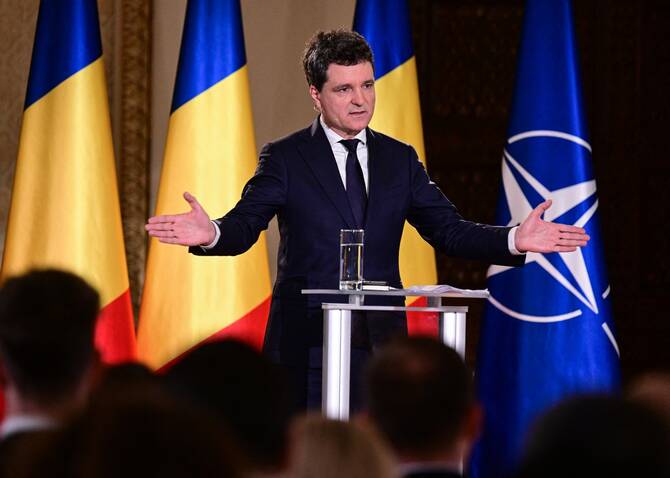European elections manifest more division, less unity

https://arab.news/2nyn6
One must admit that Europe today is increasingly gripped by two narratives. One is clearly in favor of the West, Brussels, democracy and the rule of law, and is anti-Russia. The other is skeptical of the ruling Western elite, perceiving its style of democracy and politics as “corrupt,” while having an inflated sense of patriotism. It prioritizes a conservative, us-versus-them approach, is anti-EU, antiwar in Ukraine and pro-Russian appeasement.
This clash of narratives — in addition to debates on immigration — has dominated the political space in Europe for the past decade at least, allowing the rising forces of ultranationalist, far-right firebrands to capture an oversized chunk of electoral support. These forces are modeled on the “Take Back Control” movement in the UK, “Make America Great Again” in the US, Hungary’s Viktor Orban and a so-called struggle for Christianity and sovereignty within the EU.
This is a result of increasingly large parts of populations everywhere feeling the crunch due to economic stagnation, the rising cost of living and shrinking state services. Meanwhile, trust in traditional politics and state institutions is diminishing, fueled by a toxic digital realm that is pumping out a sense of despair and normalizing chaos in great swathes of the Western democratic world.
Despite all this, Europe can this week breathe easy, or at least easier, after a series of elections over the weekend. Romanian voters kept the ultra-right at bay. In Portugal, the defeat of anti-EU populists was not so clear, with Lisbon now bracing for another minority government coalition after a third election in three years. Poland, another country that is critical for EU unity and the bloc’s support for Ukraine in its war against Russia, will have to wait until June 1 for a runoff election amid a very tight race for the presidency between center-right and ultra-right candidates.
The rising forces of ultranationalist, far-right firebrands have captured an oversized chunk of electoral support
Mohamed Chebaro
But the rise of the far right continues to pose a clear and present danger for European democracies, sowing greater division and less unity. Short of actively opposing their divisive narrative through the mobilization of middle-ground, tolerant voices in society and politics, the still-marginal but highly vocal populists could, with time, become a potent force. They will continue to target disillusioned voters, even though their record when they have been in government has been poor. They have consistently failed to put more money in the pockets of those who are struggling or to find durable solutions to fixing the role of the state and meeting the rising welfare bill amid diminishing growth and tax returns.
In the Romanian presidential election, a turnout of nearly 65 percent, the highest for a quarter of a century, appears to have prevented a lurch toward the ultra-right and all that would have meant for the country’s strategic alignment and economic prospects, as well as EU unity.
New President-elect Nicusor Dan did not mince his words in the run-up to Sunday’s second round of voting, claiming that it was a battle between “a pro-Western and an anti-Western Romania.” He managed to beat ultranationalist George Simion by a convincing margin in the election, which was a rerun after last year’s first round was annulled due to alleged Russian meddling.
Dan is an example of how centrist forces can win against all odds. A modest but driven math prodigy, Dan made a name for himself fighting corrupt property developers in Bucharest before becoming the capital’s crusading mayor. Now he can become a savior for his country if he succeeds in keeping it firmly on its pro-European track.
EU leaders rushed to congratulate Dan, claiming that his victory was a triumph for a “strong Europe” and the EU’s continued support of Ukraine, as Bucharest plays an important logistical role in Kyiv’s war against Russia. It was also a strong signal of the country’s firm attachment to the Western mainstream, democracy, the rule of law and the EU, as French president Emmanuel Macron said.
Others, like the EU’s so-called disrupters-in-chief Orban and Slovakia’s Robert Fico, were deprived of another ally to oppose the continued EU military aid to Ukraine, common energy policy, enlargement and the bloc’s budget, which is geared toward long-awaited independence in defense.
They will continue to target disillusioned voters, even though their record in government has been poor
Mohamed Chebaro
Dissatisfaction with the Romanian election result was felt even more poignantly by the Kremlin, which called the election “strange,” alluding to Western meddling in the annulment of the initial election and banning of leading candidate Calin Georgescu. Russia has previously denied any role in Georgescu’s campaign. He was disqualified after the authorities found evidence of Russian influence and funding on his behalf.
Dan, like many leaders in Europe, faces a daunting array of challenges. If he is to succeed, the liberal with a conservative touch — a social activist-turned-politician — needs to bank on his reputation as a calm, analytical, methodical and, above all, modest person with an untarnished reputation to reduce Romania’s budget’s deficit, while also repairing the damage done to a market spooked by a possible win for the far right.
The Romanian president has a semi-executive role with considerable power over foreign policy, national security, defense and judicial appointments. The new president need not ruffle the feathers of a volatile electorate, with the toxic pro-Russian narrative having already undermined the political elite. He will have to tread carefully in his pro-EU, pro-NATO approach, while also trying not to irritate the US president.
- Mohamed Chebaro is a British-Lebanese journalist with more than 25 years’ experience covering war, terrorism, defense, current affairs and diplomacy.








































